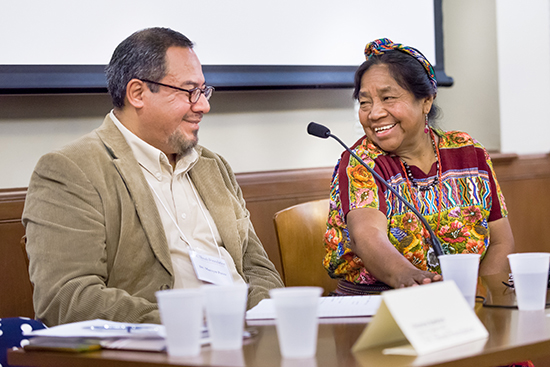Rosalina Tuyuc Velasquez and Marvyn Perez Give Keynote at Guatemala Conference


Guatemalan Genocide activists Rosalina Tuyuc Velasquez and Marvyn Perez delivered impassioned remarks urging accountability and collective healing at the keynote presentation of the conference “A ‘Conflict?’ Genocide and Resistance in Guatemala” on Monday night.
Tuyuc is a Mayan human rights activist and the first indigenous woman to be elected to Guatemalan Congress. Her father and husband were forcibly disappeared during the genocide and believed to be murdered. She founded the National Association of Guatemalan Widows (CONAVIGUA), which is a leading human rights organization that focuses on peaceful resistance, equality for women and fighting impunity.
Tuyuc began her speech by asking all in attendance to stand and give a round of applause in honor of the victims of the genocide.
“They died with dignity and the hope that someday in our country there will be change,” she said. “Their blood will serve to create peace in this world.”
In her remarks, Tuyuc emphasized that indigenous communities have always been active participants and leaders in their own destinies, despite being excluded from public administration and leadership. The genocide was the state’s attempt to “totally annihilate” indigenous people, yet the people found ways to resist by working together – young and old, civilians and activists alike.
Even now, the fight continues to “not go backwards,” Tuyuc said. Though society is generally more aware of the genocide than they were 20 years ago, the state still resists calling it a “genocide” and doesn’t want to listen to victims. Organizations that helped in the immediate aftermath of the genocide have begun to pull out of Guatemala, thinking their work is done, when Guatemalans are still struggling for collective healing and justice.
“Human rights are universal. Truth is universal. The right to life is universal,” she said. “The voices of the dead have spoken.”
Perez spoke next, detailing the ordeal he endured as a teenager and for which he is still searching for justice.
He and 15 other high school students were kidnapped, interrogated by both civilian and military police and tortured for two weeks, all for simply asking Guatemalan officials for more teachers and school supplies. Though Perez and others were eventually released, some of those students have never been found again.
While being detained, Perez said, “I felt a profound cold. I lost hope. I never believed we would come out of that place.”
Perez continues to this day to search for the men who interrogated and tortured him, including one blond man who he believes was not Guatemalan. He has searched official documents, recreated images of what these men looked like, and attempted to trace the chain of command that led to this group of innocent teenagers to be targeted.
“I always find information, little by little,” Perez said.
One audience member asked why it is so important that the Guatemalan conflict be referred to as a “genocide.” Tuyuc said we cannot let the perpetrators live in impunity because it affects future generations.
“Any genocide that occurs must be condemned. No war is acceptable,” Tuyuc said.
Another question was about healing. How can survivors and Guatemala as a whole heal if there is no justice? Is healing even possible without justice?
Perez said he believes healing is possible even if the perpetrators have not yet been punished for their crimes. He and other survivors must find a way to heal on their own because there are so many obstacles that make the judicial process take a very long time. They cannot wait for justice to start living fulfilling, meaningful lives.
“You have to have a lot of patience,” he said.
Tuyuc said in the absence of support from the state, survivors have had to help themselves heal. She revealed that she at first felt guilty for her father’s and brother’s disappearances because the army had come to their house looking for her. But through a health program for survivors, she came to understand that it wasn’t her fault. Rape and sexual assault victims who are involved in CONAVIGUA hear a similar message.
“It is not their shame, it is the shame of the perpetrators,” Tuyuc said. "We must have collective healing because the damage affects everyone."
Like this article? Get our e-newsletter.
Be the first to learn about new articles and personal stories like the one you've just read.